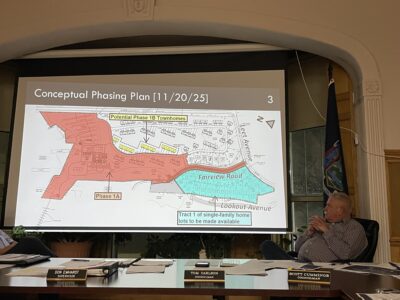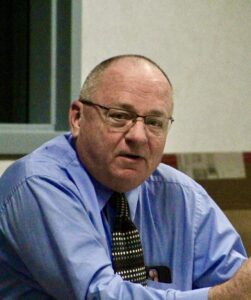Consensus needed to address climate change

Photo by Georgia Pressley/The Chautauquan Daily Bob Inglis is pictured Monday at Chautauqua Institution discussing climate change. Speakers this week will focus on “The Wild: Reconnecting With Our Natural World.”
CHAUTAUQUA — Is climate change real?
Bob Inglis argues that climate change is real, and he is hoping the United States will make a permanent decision about solving the problem.
Inglis, a former politician, spoke to an Amphitheater audience Monday beginning the week of lectures on “The Wild: Reconnecting With Our Natural World.”
He asked audience members to first identify what political party they were affiliated with, and then asked if they believed climate change was real and caused by humans. Finally, he asked if climate changed can fixed. Many people who identified as left of center indicated the climate can be fixed, while few people who identified as right of center indicated the climate can be fixed.
He was elated with the sparse findings.
“You are my people. And so, because you are the most important people in the world, and you have to change the world,” Inglis said.
One of the reasons that the conservative former lawmaker became interested in a liberal cause like climate change is because he saw firsthand the ice core drillings in Antarctica. Another reason, he said, was that he was shown the glories of the Great Barrier Reef, located in the Coral Sea off the coast of Queensland, Australia.
Inglis said there are three climate change options available to the U.S. and the world: regulate emissions; incentivize clean energy; and price in the negative effects of burning fossil fuels. He said if the Green New Deal is reduced to legislation it would favor regulation.
But, he added, there is a problem with the regulation approach: how will China regulate its emissions?
“If we regulate here (the U.S.), and they don’t regulate there, manufacturers pick up and move from here to there,” he said. “They (U.S. manufacturers) emit more when they get there than they were emitting here because we’re way more energy efficient than China is. So the risk of this regulatory approach in all humility, really, even if you’re left of center, is you could go downhill on solving climate change.”
To incentivize clean energy, he said, it would have to be done through the tax code, where American taxpayers are given credits to take certain actions.
For incentivizing clean energy, Inglis echoed his statement on regulation: How does the U.S. incentivize China?
“Well, do you see the similarity of that solution with the first one? It’s got the same pitfall, which is how do you incentivize Chinese corporations or individuals to do things with the American tax code? (The) answer (is) you can’t. So you might end up in the same spot,” he said.
Inglis is fond of the third option: a carbon tax.
He explained with a carbon tax, taxes from other places would be cut or the money from the carbon tax is given back to U.S. citizens in the form of a dividend. He went on to explain if the carbon tax is applied to goods coming from countries that don’t have the same carbon tax, the U.S. would overcome the first two options.
“So we have the ability to say OK, we got a carbon tax now and you know what you’re going to pay it on the way into our country with your goods,” he said.
China objects, and the World Trade Organization said it can’t be done. A way it could be done, he suggested is an example where China enacts its own carbon tax, so it would not pay a tax on goods coming into the U.S.
Inglis said there needs to be a bipartisan consensus on climate change, and the challenge for the U.S. is for the left to accept something that would work on the right.
“If you don’t remember anything else from what I say today, please leave here with the hope and the optimism that we are going to act on climate change. The only question is whether we act soon enough to avoid the worst consequences, but we will act,” he said.
According to assembly.chq.org, Inglis is the founder and executive director of republicEn.org, a nationwide community of conservatives that promotes free-enterprise action on climate change. Based out of the Center for Climate Change Communication at George Mason University and formerly known as the Energy and Enterprise Initiative, it was founded and launched by Inglis in July 2012. A Republican and former member of the U.S. House of Representatives, Inglis represented South Carolina’s 4th Congressional District, where he spoke out against climate change and offshore oil drilling. Inglis was elected to the U.S. Congress in 1992, having never run for office before. He represented Greenville-Spartanburg, South Carolina, from 1993 to 1998, and in 2004, he was reelected to Congress and served until losing reelection in the South Carolina Republican primary of 2010.
After his time in Congress, Inglis was a Resident Fellow at Harvard University’s Institute of Politics in 2011, a Visiting Energy Fellow at Duke University’s Nicholas School of the Environment in 2012, and a Resident Fellow at the University of Chicago’s Institute of Politics in 2014. Inglis was featured prominently in the film Merchants of Doubt and appeared in the Showtime series Years of Living Dangerously. For his work on climate change, Inglis received the 2015 John F. Kennedy Profile in Courage Award. He is a graduate of Duke University and the University of Virginia School of Law. Before and between his years in Congress, he practiced commercial real estate law in Greenville, S.C.





